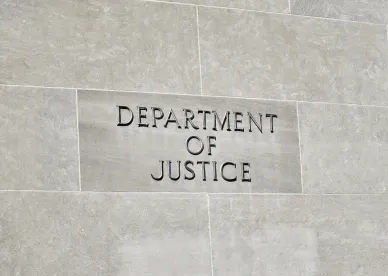It is said that people “come together” in times of crisis. Yet, businesses should be wary of collaboration with their rivals because antitrust laws apply equally in times of emergency as well as prosperity. Indeed, recent history and announcements from the Department of Justice signify a heightened focus on antitrust enforcement, especially with respect to markets affected by the COVID-19 pandemic.
Similarly, while there are motivational quotes about finding “opportunities” in a crisis, companies should be mindful of how their practices appear to outsiders. State and federal laws prohibit opportunistic business practices such as price gouging, hoarding, and the broadly and ill-defined “unfair and deceptive trade practices” in the Federal Trade Commission Act and state consumer protection statutes.
The DOJ and FTC announced on Tuesday an expedited process for companies seeking business review letters or advisory opinions for coronavirus-related conduct “addressing public health and safety.”1 While the agencies announced they will “account for exigent circumstances in evaluating [collaborative] efforts to address the spread of COVID-19 and its aftermath,” the agencies also strongly warned against efforts to take advantage of the pandemic through violations of consumer protection statutes and antitrust laws.
We have looked at the history of competition law in past economic crises and put together this guide addressing the issues companies should keep in mind today when dealing with pricing decisions, information sharing and collaboration, and other competition related issues during the COVID-19 crisis.
Antitrust Enforcement in Past Economic Crises
External crises and economic hardship can shake even the most strident crusader’s belief in the effectiveness of free markets and competition. Teddy Roosevelt, the famous trustbuster, changed his tune during the Panic of 1907, when he supported U.S. Steel’s acquisition of a rival steel firm. In 1918, the Department of Justice suspended most antitrust cases after the Attorney General determined that antitrust law would be an impediment to the war effort. Herbert Hoover was not very interested in antitrust laws when the Great Depression hit, leading to what some called “the era of antitrust neglect.” And during the first half of the New Deal, Franklin Roosevelt effectively suspended antitrust law through the National Industrial Recovery Act and its system of industry-sponsored codes, which allowed industries to agree to limit price competition and restrict production—all in the name of factory investment and job creation. Historians, however, believe such efforts may have prolonged the Depression.2
Unless and until such “industrial nationalization” laws are passed, however, the Sherman Act and its prohibitions on unreasonable restraints of trade and monopolization remain the law in the United States. Therefore, businesses should remain mindful of advice from antitrust counsel to be wary of information sharing and any sort of coordination or cooperation among rivals.
In more recent history, the United States has remained more or less consistent in its enforcement of antitrust laws, even during times of economic hardship.3
For example, in May 2009, after the beginning of the Great Recession, the head of the DOJ Antitrust Division, Christine Varney announced that the Government would not ignore antitrust law in the midst of financial hardship: “First, there is no adequate substitute for a competitive market, particularly in times of economic distress. Second, vigorous antitrust enforcement must play a significant role in the Government’s response to economic crises to ensure that markets remain competitive.”4
Similarly, in the aftermath of hurricanes Katrina and Rita in 2015, the DOJ announced that “federal antitrust laws are sufficiently flexible and resilient to accommodate beneficial collaborations,” but at the same time the DOJ “will not tolerate” any price fixing or market allocation, especially when such collaboration “prey[s] upon those affected” by the emergencies.5
Antitrust Enforcement in Response to Coronavirus Pandemic
In response to supply challenges caused by the COVID-19 panic, competition law authorities in the UK and EU announced relaxation of certain restrictions on collaboration among competitors. For example, the UK temporarily relaxed rules to allow supermarkets to share data with each other about stock levels, share distribution facilities and transportation, pool staff, and cooperate to keep stores open.6 Similarly, EU competition agencies announced they would not “actively intervene” when companies cooperate to supply scarce products as COVID-19 panic disrupts normal supply chains. Both the EU and UK regulators, however, emphasized that they would still enforce anticompetitive collaborations, as well as suspected price gouging.
Rather than announcing a loosening of competition laws, United States regulators appear to be clamping down, with a special focus on industries impacted by the COVID-19 crisis.
For example, the Department of Justice recently announced its intention to hold accountable anyone who violates antitrust laws in connection with the manufacturing, distribution, or sale of public health products. The DOJ warned against price fixing, bid rigging, market allocation schemes, and other anticompetitive conduct. Similarly, state attorneys general have warned wholesalers and retailers against false advertising and price gouging related to COVID-19 pandemic. And the FDA and FTC recently issued warning letters to seven companies for selling fraudulent COVID-19 products.
Tuesday’s announcement that the FTC and DOJ will expedite evaluation of business review letters and advisory opinions related to collaborations among businesses to fight the epidemic also came with a warning:
While many individuals and businesses have and will demonstrate extraordinary compassion and flexibility in responding to COVID-19, others may use it as an opportunity to subvert competition or prey on vulnerable Americans. The Division and the Bureau will not hesitate to seek to hold accountable those who do so. In particular, the Division and the Bureau stand ready to pursue civil violations of the antitrust laws, which include agreements between individuals and business to restrain competition through increased prices, lower wages, decreased output, or reduced quality as well as efforts by monopolists to use their market power to engage in exclusionary conduct. The Division will also prosecute any criminal violations of the antitrust laws, which typically involve agreements or conspiracies between individuals or businesses to fix prices or wages, rig bids, or allocate markets.
The trajectory of these announcements clearly demonstrate that federal and state regulators in the United States will not shy away from antitrust enforcement, especially if it is related to health care, supply shortages, or economic disruption caused by the pandemic.
Moreover, unlike the situation during the early part of the twentieth century, today most antitrust cases are filed by private parties, rather than government regulators. In other words, even if the federal government and state attorneys general loosen their own standards for antitrust enforcement, private litigants may still file lawsuits alleging antitrust claims. One study has even suggested that private antitrust enforcement may be counter-cyclical, with more antitrust cases coming in times of economic hardship. A recent report shows that from 2013 to 2018, over $19 billion was awarded in private antitrust class action settlements, the majority of which involving unlawful collaborations among competitors.
In summary, in the United States, companies should be wary of the mantra of “working together” during a crisis. The antitrust laws remain in full force and effect during times of crises and there even may be increased attention given to certain aspects of antitrust law in today’s environment. Below is a summary of the most important reminders about antitrust law.
Antitrust Basics for Collaboration
Economic pressure caused by a crisis may cause companies to scramble to stay afloat, but seeking temporary truces with rivals to avoid competition is not allowed, regardless of the exigent circumstances. On the other hand, many collaborations may be pro-competitive and serve noble public purposes—such as protecting public health, developing needed technologies, or setting industry standards that ensure interoperability or consumer safety. Womble Bond Dickinson attorneys are available to assist companies evaluate business plans to ensure compliance.
Certain types of agreements among competitors are deemed to always harm competition and are thus illegal “per se.” These include price-fixing, bid rigging, and group boycotts (agreements among competitors to refuse to deal with another market participant or to do so only on certain terms).
While this might seem straightforward, it is important to keep in mind that competitors do not have to reach an express agreement in order to violate the antitrust laws. An illegal agreement can be formal or informal, written or oral, and may be implied from the mere fact that competitors exchanged competitive information and then acted in the same manner. Competitors also do not have to be at the same level of distribution—illegal agreements can occur between buyers and sellers of goods and services as well. Thus, a discussion at an industry group meeting about how to address supply chain disruptions may veer into the antitrust danger zone.
Other types of agreements are judged under the so-called “rule of reason” standard. Thus, whether they are illegal depends on the facts and circumstances of each situation, and whether the agreement’s procompetitive benefits outweigh any restraint on competition. Often, under the “rule of reason,” there are no bright line rules, and collaborations should be reviewed on a case-by-case basis to ensure compliance.
Information Exchanges
Businesses that exchange information in response to the COVID-19 panic should carefully identify the procompetitive reasons for doing so and ensure their discussions are tailored to that purpose. Thus, competitors participating in meetings regarding development of COVID-19 policies, potential workforce disruptions, and personnel safety, for instance, should ensure that they do not discuss other competitively sensitive information. They should also ensure the reason for the meeting is well documented and consider having counsel for the industry or trade group present.
Companies should also not exchange competitively sensitive information—such as information about prices, costs, output, or economic terms and conditions under which they purchase goods or services—without careful and thorough antitrust counsel. There may very well be procompetitive reasons to share such information. A carefully crafted program with appropriately collected industry-wide data may help businesses independently forecast shocks to critical supply chains or demand for certain products. However, such data needs to be properly anonymized and aggregated to ensure that that recipients cannot “back out” information about individual competitors or that the data might otherwise be used to facilitate illegal collusion.
It is also important to remember that the market for employees is an economic market just like any other. Thus, while HR directors at competing firms may collaborate to discuss how to ensure employee safety—including work-from-home policies, travel restrictions, staggered work arrangements, and efforts to meet child-care needs of essential employees—they need to be careful not to exchange information about salaries, benefits, or other economic terms of employment. Companies must also avoid anything that resembles so-called “no-poach” agreements (agreements not compete for one another’s employees), or any agreement to provide employees the same or similar wages and benefits. Public and private antitrust actions challenging employment practices have been on the rise of the past decade. FTC and DOJ have issued guidance to employers, including “red flags” for employment practices. The response to the COVID-19 outbreak is likely to only elevate the focus on antitrust compliance among employers.
Price Gouging, Hoarding, Deceptive Practices, and Unfair Competition
Price gouging is typically governed by individual state statutes and enforced by state attorneys general. Womble Bond Dickinson has issued a separate client alert regarding price gouging under state law in the wake of emergency declarations announced by state governors.
Since then, the federal government has also warned against price gouging. On Monday, March 23, Attorney General William Barr announced an executive order signed by the President under the Defense Production Act which prohibits hoarding and price gouging of scarce resources. The order gives the Secretary of Health and Human Services the authority to designate certain supplies as “critical.” Barr explained that “once specific materials are so designated, persons are prohibited from accumulating those items in excess of reasonable personal or business needs or for the purpose of selling them in excess of prevailing market prices.” No materials have yet to be designated as critical, but the procedures are now in place for doing so.
Additionally, the FTC Act prohibits, in vague and general terms, “unfair methods of competition in or affecting commerce and unfair or deceptive acts or practices in or affecting commerce.” Most states have adopted their own version of consumer protection laws, the contours of which vary from state to state. Often these statutes are intentionally vague to provide law enforcement flexibility to address unscrupulous and unfair business practices.
Often it is clear what is meant by “unfair” and “deceptive.” For example, the FTC has sent warning letters to seven sellers of scam coronavirus treatments, and has cautioned consumers to look out for scams such as: (1) online sellers claiming to have in-demand products, such as cleaning or medical supplies, but not shipping the ordered products; (2) fake charities taking advantage of people’s generosity; (3) fake emails and phishing scams; (4) robocalls; and (5) misinformation and rumors.
Other times, however, the open-ended definition of “unfair” or “deceptive” may not be so clear. Companies perceived to be taking advantage of consumer’s fear or anxiety may face serious sanctions under the sweeping jurisdiction of federal and state consumer protection statutes. Companies, therefore, should think twice about how their conduct may look to outsiders. Opportunistic business practices in a time of crisis could potentially run afoul of these consumer protection statutes.
So, what to do?
In these uncertain times, the urge to take action is countered by analysis paralysis. The Womble Bond Dickinson COVID-19 team is available to address your general concerns, and the Antitrust Practice team stands by to address the issues mentioned in this article. A deep understanding of antitrust laws and history guides us, and we can help your company navigate the reality of daily changes, planning and action in these troubled times. Now is not the time to forget the lessons from your antitrust training and compliance programs, and if it has been a while since your last antitrust training, we are available to set up such programs and offer immediate advice and counseling.
1 https://www.ftc.gov/system/files/documents/public_statements/1569593/statement_on_coronavirus_ftc-doj-3-24-20.pdf
2 See generally Carl Shapiro, “Competition Policy in Distressed Industries,” Remarks as Prepared for ABA Antitrust Symposium (May 13, 2009), available at https://faculty.haas.berkeley.edu/shapiro/distressed.pdf. Daniel A. Crane, Did We Avoid Historical Failures of Antitrust Enforcement During the 2008-2009 Financial Crisis?, 77 Antitrust L.J. 219 (2010).
3 Crane.
4 Christine A. Varney. Ass’t A.G., Antitrust Division, US Dep’t of Justice, Vigorous Antitrust Enforcement in This Challenging Era, Remarks Prepared for the United States Chamber of Commerce (May 12, 2009) available at: https://www.justice.gov/atr/speech/vigorous-antitrust-enforcement-challenging-era.
5 https://www.justice.gov/atr/antitrust-guidance-hurricanes-katrina-and-rita
6 https://www.gov.uk/government/news/supermarkets-to-join-forces-to-feed-the-nation?utm_source=313b2222-28f2-4cad-ba9a-bd6a33d8168b&utm_medium=email&utm_campaign=govuk-notifications&utm_content=immediat
7 https://www.justice.gov/opa/pr/justice-department-cautions-business-community-against-violating-antitrust-laws-manufacturing
8 https://www.nbcnews.com/politics/politics-news/states-push-price-gouging-measures-coronavirus-fuels-consumer-fears-n1163846; https://www.nbcdfw.com/news/coronavirus/texas-attorney-general-warns-against-price-gouging-scams/2336162/; https://sanfrancisco.cbslocal.com/2020/03/23/coronavirus-false-advertising-price-gouging-california-xavier-becerra/.
9 https://www.fda.gov/news-events/press-announcements/coronavirus-update-fda-and-ftc-warn-seven-companies-selling-fraudulent-products-claim-treat-or.
10 https://www.ftc.gov/system/files/documents/public_statements/1569593/statement_on_coronavirus_ftc-doj-3-24-20.pdf
11 Lance Bachmeier et al., The Volume of Federal Litigation and the Macroeconomy, 24 Int’l Rev. L. & Econ. 191 (2004).
12 See Department of Justice, Antitrust Division and Federal Trade Commission, Antitrust Guidance for Human Resources Professionals, October 2016; see also Antitrust Red Flags for Employment Practices.
13 https://thehill.com/homenews/administration/489125-trump-signs-executive-order-to-prevent-price-gouging-of-medical
14 15 U.S.C. § 45(a)(1)





 />i
/>i

